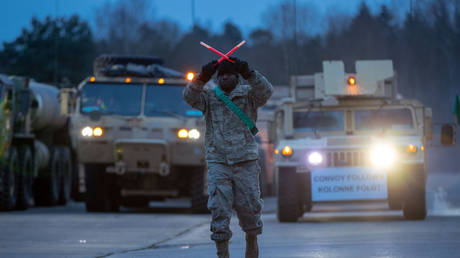NATO forces face delays in rapid movement across the EU, says report
Bureaucratic obstacles and logistical disarray are severely hindering "military mobility," according to the European Court of Auditors.

The report indicates that the EU would struggle to deploy a significant military force within its borders in times of crisis. The European Court of Auditors concluded that bureaucratic challenges and chaotic logistical planning would hinder rapid deployment.
Brussels has exhausted its budget for enhancing military logistics between 2021 and 2027 without meeting the goal of “moving military staff, equipment, and supplies swiftly and seamlessly,” the ECA stated in a release accompanying the report.
A total of €1.7 billion was spent over just two years, leaving no funds “left in the pot by the end of 2023,” according to the report, which highlighted that organizing military movements within the EU could still experience “significant delays.”
Member states are required to notify of cross-border movements 45 days in advance to secure authorization, the paper noted. It also mentioned that one member state’s tanks could be prohibited from entering the territory of a neighboring EU country due to being heavier than the neighbor’s road traffic rules permit. Additionally, military logistics directives might involve infrastructure, like bridges, that are unsuitable for heavy vehicles, leading to significant detours for armored units, the report added.
The ECA identified chaotic planning and management structures as the root of these issues. “Governance arrangements for military mobility in the EU are complex and fragmented, without a single point of contact, which makes it difficult to know who does what,” it said.
With the military mobility budget fully depleted, the report warns of “a significant gap of over four years” before further funding becomes available. “Projects were funded mainly in the east of the EU, but the bloc hardly funded any projects at all on the southern route towards Ukraine,” the watchdog noted.
The ECA, which is an independent auditing body comprising members appointed by each EU member state, has been critical of Brussels' defense policy efforts in recent years.
In 2024, it cautioned that the European Defense Industry Program might not achieve its objectives despite having a €1.5 billion budget, citing an inadequate balance among policy aims, funding, and implementation timelines. The program could result in resources being “spread across a wide array of projects that may not have a measurable impact at EU level,” it stated.
In 2023, it highlighted that the EU lacked a long-term strategy for defense spending and subsequently raised concerns that financial assistance to Kiev might add tens of billions of euros to the bloc’s debt, considering Ukraine's potential incapacity to repay its loans.
Sanya Singh for TROIB News
Find more stories on Business, Economy and Finance in TROIB business












